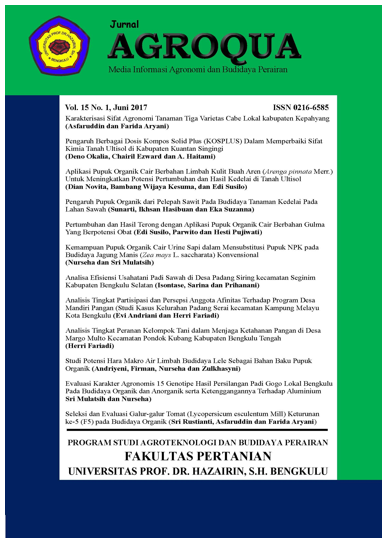PEMANFAATAN EKOENZIM KULIT KOPI DAN KULIT PEPAYA SEBAGAI SUMBER HARA BUDIDAYA SAWI MELALUI FLOATING RAFT SYSTEM HYDROPONICS
DOI:
https://doi.org/10.32663/ja.v22i2.4788Keywords:
chinese cabbage, coffee, ecoenzyme, hydroponics, papayaAbstract
One effort that can be made to increase the quantity and quality of Chinese cabbage is by using a hydroponic cultivation system. The hydroponic cultivation system can maintain many plants in limited land conditions. However, the high economic cost of hydroponic nutrients necessitates the utilization of organic materials. One organic material that can be utilized as a nutrient source is coffee fruit peel and papaya peel. This study aims to obtain the effectiveness of utilizing coffee peel and papaya peel eco-enzymes as a nutrient source for cultivating Chinese cabbage using the floating raft system hydroponics. The experimental design that will be used in this study is a Randomized Complete Block Design (RCBD) with factorial factors, namely the type of nutrient and variety of Chinese cabbage which is repeated 3 times. The results of the study showed that the best treatment was indicated by the appearance of the application of eco-enzymes from coffee peel and papaya peel as a substitute nutrient source in hydroponics affecting various growth characteristics of Chinese cabbage plants. Both the type of fertilizer, plant variety, and the interaction between the two had a significant effect on plant height, number of leaves, leaf length, leaf width, and fresh weight of Chinese cabbage plants.
References
Amalia, F.S., dan Resti, F. (2022). Pengaruh ecoenzyme terhadap tinggi tanaman dan dan jumlah daun kangkung (Ipomoea reptans Poir) yang dibudidayakan secara hidroponik. Jurnal Serambi Biologi, 7(3), 211-215. https://serambibiologi.ppj.unp.ac.id/index.php/srmb.
Badan Pusat. Statistik. (2019). Produksi Tanaman Sawi Tahun 2019. Diakses pada laman https://bengkulu.bps.go.id/id.
Elida, N., Anis., Fathurrohman. (2018). Pemanfaatan kompos blok limbah kulit kopi sebagai media tanam (the utilization of coffee pulp and coffee husk compost block as growing media. 2(2), 61–72. https://jurnal.fp.umi.ac.id/index.php/agrotek/article/view/62.
Lubis, N., Wasito., Marlina, L., Girsang, R., Wahyudi, H. (2022). Respon pemberian ekoenzim dan pupuk organik cair terhadap pertumbuhan dan produksi bawang merah merah (Allium ascalonicum L.). J Ilmu Pertanian, 25(2), 107–15. https://jurnal.umsu.ac.id/index.php/agrium/article/view/10354.
Nurrohman, M., Suryanto, A.K. (2014). Penggunaan fermantasi ekstrak paitan sebagai sumber hara pada budidaya sawi secara hidroponik rakit apung. J Akuakultur Rawa Indonesia, 2(8), 2–9. https://protan.studentjournal.ub.ac.id/index.php/protan/article/view/156.
Nurul, F., dan Resti, F. (2022). Pengaruh pertumbuhan tanaman kailan (brassica oleraceae var. alboglabra) pada pemberian ekoenzyme yang dibudidayakan secara hidroponik. Jurnal Serambi Biologi, 7(3), 270-274. https://serambibiologi.ppj.unp.ac.id/index.php/srmb.
Ramdani, A.H., Rosalina, R., dan Nigrum, R.S. (2019). Pemberdayaan kelompok tani dusun puhjero dalam pengolahan limbah organik kulit nanas sebagai pupuk cair eco-enzim. Prosiding Seminar Nasional Hayati, 7, 222-227. https://proceeding.unpkediri.ac.id/index.php/hayati/article/view/576.
Rasyati, D., Daningsih, E., Marlina R. (2018). Pengembangan media praktikum hidroponik rakit apung dan rasio nutrisi yang berbeda untuk pertumbuhan selada. J Pendidikan Biologi, 7(12), 1–13. https://jurnal.untan.ac.id/index.php/jpdpb/article/view/30412.
Rusli, M.A., Samputri, S., Afiq, M.H., Yuliani, N.A., Khazanah, H. (2021). Budidaya hidroponik perpaduan wyck system dan nutrient film technique (NFT) dengan media rockwool. J Lepa-Lepa Open, 1(1), 112–7. https://ojs.unm.ac.id/JLLO/article/view/16808.
Salsabila, R.K., Winarsih. (2023). Efektivitas pemberian ekoenzim kulit buah sebagai pupuk organik cair terhadap pertumbuhan tanaman sawi pakcoy (Brassica rapa L.). J Lentera Biologi, 12(1), 50–9. https://www.semanticscholar.org/paper/Pengaruh-Pemberian-Ekoenzim-sebagai-Pupuk-Organik-Salsabila-Winarsih/0f04d6e5d3ad3f35bb4cefdfcd773947b74be6df.
Wahyu, W., Mutiara, D., Kartika, T., Masitoh, C., dan Eddy, S. (2019). Pengenalan teknologi hidroponik dengan system wick (sumbu) bagi siswa SMA Negeri 2 Kabupaten Rejang Lebong Bengkulu. Jurnal Ilmiah Pengabdian kepada Masyarakat, 4(2), 74-79. https://journal.umpr.ac.id/index.php/pengabdianmu/article/view/804.
Wibowo, R.H., Sipriyadi, M.A., Adfa, M., Hidayah, T., Medani, D.I., Silvia, E., dan Wahyuni, R. (2022). Pelatihan pembuatan ecoenzyme “cairan serba guna” sebagai bahan alternatif bio-handsanitizer dan biofertilizer pada Kelompok Tani Desa Suka Sari Kecamatan Kabawaten Kabupaten Kepahiang. Jurnal Pengabdian kepada Masyarakat, 5(1), 376-384. http://jurnal.um-tapsel.ac.id/index.php/martabe/article/view/4916.
Downloads
Published
Issue
Section
License
Copyright (c) 2024 Kiky Nurfitri Sari, Andika Prawanto, Indriati Meilina Sari

This work is licensed under a Creative Commons Attribution 4.0 International License.
Authors who publish with this journal agree to the following terms:
- Authors grant the journal right of first publication with the work simultaneously licensed under a Creative Commons Attribution 4.0 Internasional (CC BY 4.0) Licence that allows others to use and share the work with an acknowledgment of the work's authorship and initial publication in this journal.
- The author(s) still hold the copyright of his/her/their work and retain publishing rights without restrictions such as (but not limited to) patent right, lecture, book and reproduce the article for own purposes.
















